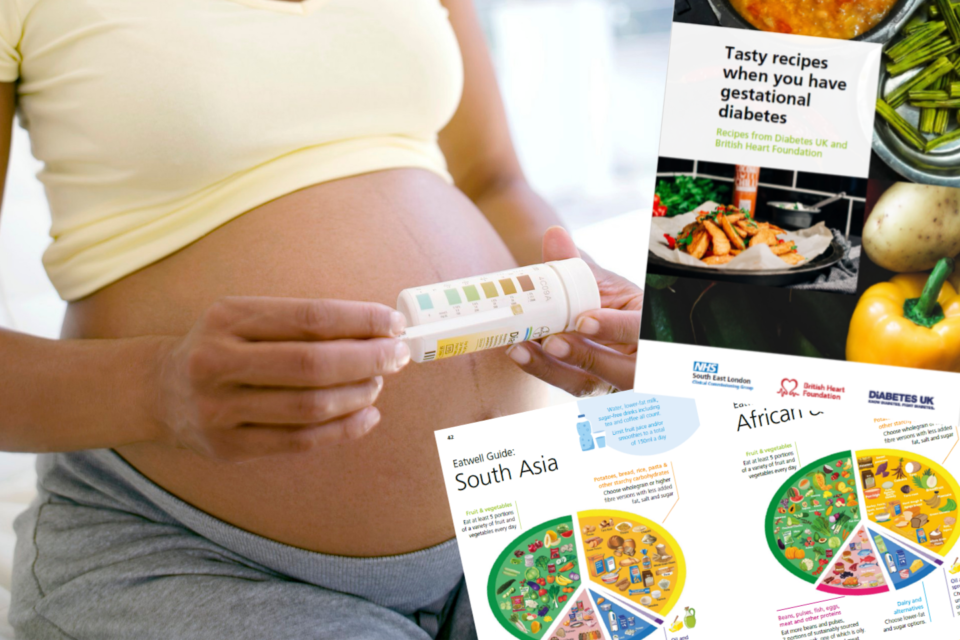There is currently a public health concern around the increase of Type 2 diabetes in the UK after gestational diabetes. In this article Laura Bridle, perinatal mental health midwife at Guys and St Thomas’ NHS foundation trust, describes the development of a culturally sensitive recipe book to aid prevention across a diverse community.
Gestational Diabetes in Black and Asian communities: creation of a pregnancy recipe book
An estimated 463 million adults were living with diabetes globally in 2019 and 4·2 million died as a result of the condition and its complications (The Lancet 2020). Gestational Diabetes (GDM) is diabetes that can develop during pregnancy and affects women who haven’t been affected by diabetes before.
In the UK, Type 2 diabetes (T2DM) following the development of GDM in pregnancy is on the rise (Devlieger et al 2016) and Black African/Caribbean and Asian women are at increased risk. Women with GDM have a 50% chance of developing T2DM within the first 5 years post birth (NICE 2015) and a recent systematic review found women with GDM were 10 times more likely to develop T2DM than those without (Vounzoulaki et al. 2020).
A report from the London School of Economics indicates that diabetes treatment costs the UK £13.75bn a year, with £11.72bn being spent on Type 2 alone (Kanavos 2012). Reassuringly, early diagnosis of diabetes and timely intervention significantly reduce long-term complications and associated healthcare costs.
Women and birthing people should have a blood test to check for diabetes 6 to 13 weeks after giving birth and once every year after that if the result is normal (NICE 2015). However uptake of this screening remains very low. Demographics have been found to influence uptake of T2DM screening. A retrospective study conducted in Sheffield, found that 74% of women who did not attend were in the two most deprived quintiles, including smokers, unemployed and those who did not breastfeed (Castling and Farrell 2019). Furthermore, a systematic review (Herrick et al. 2020) found that Black women had the lowest postnatal screening rates despite the higher risk for T2DM, highlighting a need for targeting screening and prevention.
I, Laura Bridle, am a midwife and then population health fellow based in Lewisham, and was working on a project to look at the surveillance programme being offered to women. This included the use of a database known as Cerner HealthIntent®, which is a population health management system. This data showed that only 10% of women were being screened for Type 2 Diabetes annually. When speaking to women and birthing people in clinical practice it was noted that similar barriers to screening and uptake were noted. This included not knowing this was even necessary and the lack of culturally appropriate advice being shared.
With an aim to reduce the barriers I worked closely with Pauline Cross, consultant midwife for public health, Toyin Adeyinka, Lewisham Maternity Voice Partnership Chair, Caron Gooch, specialist midwife for diabetes, Gwenda Scott and Lakhvinder Matharu, both dieticians, and women with lived experience to co-create a culturally sensitive recipe book that could be given to women and birthing people who are diagnosed with gestational diabetes. The book includes 40 recipes, discusses the need for postnatal screening for T2DM, the South Asian, Caribbean and African Eat Well Guides and details on how to access the National Diabetes Prevention Programme. All women with a history of GDM are eligible for the Healthier You programme.
With the generous financial support from South East London Local Maternity and Neonatal System (LMNS), the recipe book has been funded and over 2500 handheld books are currently being given to women and birthing people who are diagnosed with GDM. This includes all who book to birth with the 5 maternity Trusts within South East London. In addition to this, a PDF version has been created to allow for the book to be accessible for years to come and that can be accessed freely on the SE London CCG website.
This book is one tool that can be freely accessible to midwives and GP’s who can share with women who are diagnosed with GDM. This can encourage a sustainable change in diet and act as a reminder about the importance of lifetime T2DM screening.
Future work should include ways to prevent this annual screening for T2DM being missed. This could include reminders of becoming a part of national screening programme, such as cervical screening, to widening use of population health management data bringing primary and secondary data together.



References:
Castling ZA, Farrell T. (2019) An analysis of demographic and pregnancy outcome data to explain non-attendance for postpartum glucose testing in women with gestational diabetes mellitus: Why are patients missing follow-up? Obstetric Medicine. 12(2), pp. 85-9.
Devlieger R, Benhalima K, Damm P, Van Assche A, Mathieu C, Mahmood T, et al. (2016) Maternal obesity in Europe: where do we stand and how to move forward?: A scientific paper commissioned by the European Board and College of Obstetrics and Gynaecology (EBCOG). Eur J Obstet Gynecol Reprod Biol. 201, pp.203-8.
Herrick CJ, Puri R, Rahaman R, Hardi A, Stewart K, Colditz GA. (2020) Maternal Race/Ethnicity and Postpartum Diabetes Screening: A Systematic Review and Meta-Analysis. J Womens Health 29(5), pp. 609-21.
Kanavos, P., van der Aardweg, S. and Schurer W. LSE Health, London School of Economics (2012) Diabetes Expenditure, Burden of Disease and Management in 5 EU Countries. Available from: http://www.lse.ac.uk/lsehealthandsocialcare
NICE. (2015) Diabetes in pregnancy: management from preconception to the postnatal period [Available from: https://www.nice.org.uk/guidance/ng3]
The Lancet. (2020) Turning evidence into action on diabetes. Lancet. 396 (1535).
Vounzoulaki E., Khunti K., Tan B. and Gillies C. (2020) Progression to type 2 diabetes in women with a known history of gestational diabetes: systematic review and meta-analysis. British Medical Journal. 369. [accessed from: https://www.bmj.com/content/369/bmj.m1361].



